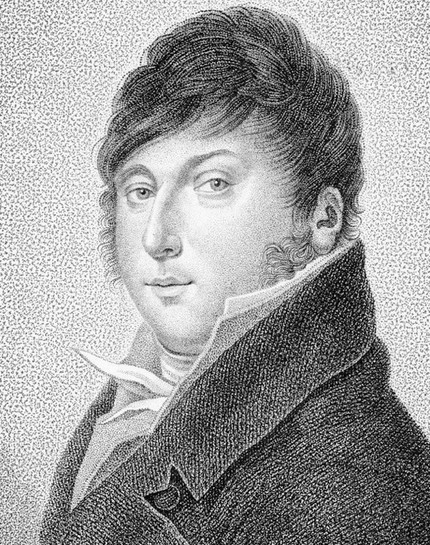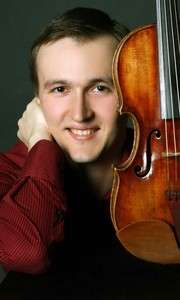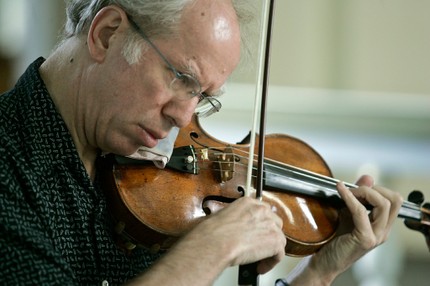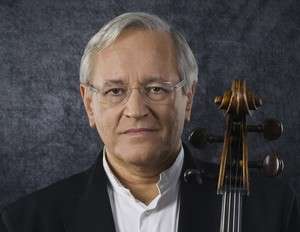
Rodolphe Kreutzer |
Rodolphe Kreutzer

Two geniuses of mankind, each in their own way, immortalized the name of Rodolphe Kreutzer – Beethoven and Tolstoy. The first dedicated one of his best violin sonatas to him, the second, inspired by this sonata, created the famous story. During his lifetime, Kreuzer enjoyed worldwide fame as the greatest representative of the French classical violin school.
The son of a modest musician who worked in the Court Chapel of Marie Antoinette, Rodolphe Kreuzer was born in Versailles on November 16, 1766. He received his primary education under the guidance of his father, who passed the boy, when he began to make rapid progress, to Antonin Stamits. This remarkable teacher, who moved from Mannheim to Paris in 1772, was a colleague of Father Rodolphe in the Marie Antoinette Chapel.
All the turbulent events of the time in which Kreuzer lived passed surprisingly favorably for his personal fate. At the age of sixteen he was noticed and highly regarded as a musician; Marie Antoinette invited him to the Trianon for a concert in her apartment and remained fascinated by his playing. Soon, Kreutzer suffered great grief – within two days he lost his father and mother and was left burdened with four brothers and sisters, of whom he was the eldest. The young man was forced to take them into his full care and Marie Antoinette comes to his aid, providing his father’s place in his Court Chapel.
As a child, at the age of 13, Kreutzer began to compose, in fact, having no special training. When he was 19 years old, he wrote the First Violin Concerto and two operas, which were so popular at court that Marie Antoinette made him chamber musician and court soloist. The turbulent days of the French bourgeois revolution Kreutzer spent without a break in Paris and gained great popularity as the author of several operatic works, which were a resounding success. Historically, Kreutzer belonged to that galaxy of French composers whose work is associated with the creation of the so-called “opera of salvation”. In operas of this genre, tyrannical motifs, themes of the fight against violence, heroism, and citizenship developed. A feature of the “rescue operas” was that freedom-loving motifs were often limited to the framework of family drama. Kreutzer also wrote operas of this kind.
The first of these was the music for Deforge’s historical drama Joan of Arc. Kreuzer met Desforges in 1790 when he led the group of first violins in the orc stra of the Italian Theatre. In the same year, the drama was staged and was a success. But the opera “Paul and Virginia” brought him exceptional popularity; its premiere took place on January 15, 1791. Some time later, he wrote an opera by Cherubini on the same plot. By talent, Kreutzer cannot be compared with Cherubini, but listeners liked his opera with the naive lyricism of music.
Kreutzer’s most tyrannical opera was Lodoiska (1792). Her performances at the Opera Comic were triumphant. And this is understandable. The plot of the opera corresponded to the highest degree with the mood of the public of revolutionary Paris. “The theme of the fight against tyranny in Lodoisk received a deep and vividly theatrical embodiment … [although] in Kreutzer’s music, the lyrical beginning was the strongest.”
Fetis reports a curious fact about Kreutzer’s creative method. He writes that by creating operatic works. Kreutzer rather followed a creative intuition, since he was poorly familiar with the theory of composition. “The way he wrote all parts of the score was that he walked with large steps around the room, singing melodies and accompanying himself on the violin.” “It was only much later,” adds Fetis, “when Kreutzer had already been accepted as a professor at the conservatory, that he really learned the basics of composing.”
It is difficult, however, to believe that Kreutzer could compose entire operas in the manner described by Fetis, and there seems to be an element of exaggeration in this account. Yes, and violin concertos prove that Kreuzer was not at all so helpless in the technique of composition.
During the revolution, Kreutzer took part in the creation of another tyrannical opera called “Congress of Kings”. This work was written jointly with Gretry, Megule, Solier, Devienne, Daleyrac, Burton, Jadin, Blasius and Cherubini.
But Kreutzer responded to the revolutionary situation not only with operatic creativity. When, in 1794, by order of the Convention, massive folk festivals began to be held, he took an active part in them. On 20 Prairial (June 8) a grand celebration was held in Paris in honor of the “Supreme Being”. Its organization was led by the famous artist and fiery tribune of the revolution, David. To prepare the apotheosis, he attracted the largest musicians – Megule, Lesueur, Daleyrac, Cherubini, Catel, Kreutzer and others. The whole of Paris was divided into 48 districts and 10 old men, young people, mothers of families, girls, children were allocated from each. The choir consisted of 2400 voices. The musicians previously visited the areas where they were preparing for the performance of the participants of the holiday. To the tune of the Marseillaise, artisans, merchants, workers, and various people of the Parisian suburbs learned the Hymn to the Supreme Being. Kreutzer got the Peak area. On 20 Prairial, the combined choir solemnly sang this anthem, glorifying the revolution with it. The year 1796 has come. The victorious conclusion of Bonaparte’s Italian campaign turned the young general into a national hero of revolutionary France. Kreuzer, following the army, goes to Italy. He gives concerts in Milan, Florence, Venice, Genoa. Kreutzer arrived in Genoa in November 1796 to participate in the academy organized in honor of Josephine de la Pagerie, the wife of the commander in chief, and here in the salon Di Negro heard the young Paganini play. Struck by his art, he predicted a brilliant future for the boy.
In Italy, Kreutzer found himself involved in a rather strange and confusing story. One of his biographers, Michaud, claims that Bonaparte instructed Kreutzer to search the libraries and identify unpublished manuscripts of the masters of the Italian musical theater. According to other sources, such a mission was entrusted to the famous French geometer Monge. It is authentically known that Monge involved Kreutzer in the case. Having met in Milan, he informed the violinist about the instructions of Bonaparte. Later, in Venice, Monge handed over to Kreutzer a casket containing copies of the old manuscripts of the masters of the Cathedral of St. Mark and asked to be escorted to Paris. Busy with concerts, Kreutzer postponed sending the casket, deciding that in the last resort he himself would take these valuables to the French capital. Suddenly hostilities broke out again. In Italy, a very difficult situation has developed. What exactly happened is unknown, but only the chest with the treasures collected by Monge was lost.
From war-torn Italy, Kreutzer crossed over to Germany, and having visited Hamburg on the way, he returned to Paris through Holland. He arrived at the opening of the conservatory. Although the law establishing it passed through the Convention as early as August 3, 1795, it did not open until 1796. Sarret, who had been appointed director, immediately invited Kreutzer. Along with the elderly Pierre Gavinier, the ardent Rode and the judicious Pierre Baio, Kreutzer became one of the leading professors of the conservatory.
At this time, there is an increasing rapprochement between Kreutzer and Bonapartist circles. In 1798, when Austria was forced to make a shameful peace with France, Kreuzer accompanied General Bernadotte, who had been appointed there as ambassador, to Vienna.
The Soviet musicologist A. Alschwang claims that Beethoven became a frequent guest of Bernadotte in Vienna. “Bernadotte, the son of a provincial French lawyer, who was promoted to a prominent post by the revolutionary events, was a true offspring of the bourgeois revolution and thus impressed the democrat composer,” he writes. “Frequent meetings with Bernadotte led to the friendship of the twenty-seven-year-old musician with the ambassador and the famous Parisian violinist Rodolphe Kreuzer who accompanied him.”
However, the closeness between Bernadotte and Beethoven is disputed by Édouard Herriot in his Life of Beethoven. Herriot argues that during the two-month stay of Bernadotte in Vienna, it is unlikely that such a close rapprochement between the ambassador and the young and then still little known musician could have occurred in such a short time. Bernadotte was literally a thorn in the side of the Viennese aristocracy; he made no secret of his republican views and lived in seclusion. In addition, Beethoven was at that time in close relations with the Russian ambassador, Count Razumovsky, which also could not contribute to the establishment of friendship between the composer and Bernadotte.
It is difficult to say who is more right – Alschwang or Herriot. But from Beethoven’s letter it is known that he met Kreutzer and met in Vienna more than once. The letter is connected with the dedication to Kreutzer of the famous sonata written in 1803. Initially, Beethoven intended to dedicate it to the virtuoso violinist mulatto Bredgtower, who was very popular in Vienna at the beginning of the XNUMXth century. But the purely virtuoso skill of the mulatto, apparently, did not satisfy the composer, and he dedicated the work to Kreutzer. “Kreutzer is a good, sweet man,” wrote Beethoven, “who gave me much pleasure during his stay in Vienna. Its naturalness and lack of pretensions are dearer to me than the external gloss of most virtuosos, devoid of internal content. “Unfortunately,” A. Alschwang adds, quoting these Beethoven terms, “dear Kreuzer subsequently became famous for his complete misunderstanding of Beethoven’s works!”
Indeed, Kreutzer did not comprehend Beethoven until the end of his life. Much later, having become a conductor, he conducted Beethoven’s symphonies more than once. Berlioz writes indignantly that Kreuzer allowed himself to make banknotes in them. True, in such a free handling of the text of brilliant symphonies, Kreutzer was no exception. Berlioz adds that similar facts were observed with another major French conductor (and violinist) Gabeneck, who “abolished some instruments in another symphony by the same composer.”
В 1802 году Крейцер стал первым скрипачом инструментальной капеллы Бонапарта, в то время консула республики, а после провозглашения Наполеона императором — его личным камер-музыкантом. Эту официальную должность он занимал вплоть до падения Наполеона.
In parallel with the court service, Kreutzer also performs “civilian” duties. After Rode’s departure for Russia in 1803, he inherits his position as soloist in the orchestra at the Grand Opera; in 1816, the functions of the second concertmaster were added to these duties, and in 1817, the director of the orchestra. He is also promoted as a conductor. How great Kreutzer’s conducting fame was can be judged at least by the fact that it was he, together with Salieri and Clementi, who conducted J. Haydn’s oratorio “Creation of the World” in 1808 in Vienna, in the presence of an elderly composer, before whom that evening Beethoven and other great musicians of the Austrian capital bowed respectfully.
The collapse of Napoleon’s empire and the coming to power of the Bourbons did not greatly affect Kreutzer’s social position. He is appointed conductor of the Royal Orchestra and director of the Institute of Music. He teaches, plays, conducts, zealously indulges in the performance of public duties.
For outstanding services in the development of French national musical culture, Rodolphe Kreutzer was awarded the Order of the Legion of Honor in 1824. In the same year, he temporarily left the duties of director of the Opera’s orchestra, but then returned to them in 1826. A severe fracture of the arm completely turned him off from performing activities. He parted with the conservatory and devoted himself entirely to conducting and composition. But times are not the same. The 30s are approaching – the era of the highest flowering of romanticism. The bright and fiery art of the romantics is victorious over decrepit classicism. Interest in Kreutzer’s music is waning. The composer himself begins to feel it. He wants to retire, but before that he puts on the opera Matilda, wanting to say goodbye to the Parisian public with it. A cruel test awaited him – a complete failure of the opera at the premiere.
The blow was so great that Kreutzer was paralyzed. The sick and suffering composer was taken to Switzerland in the hope that the salubrious climate would restore his health. Everything turned out to be in vain – Kreuzer died on January 6, 1831 in the Swiss city of Geneva. It is said that the curate of the city refused to bury Kreutzer on the grounds that he wrote works for the theatre.
Kreutzer’s activities were wide and varied. He was highly respected as an opera composer. His operas were staged for decades in France and other European countries. “Pavel and Virginia” and “Lodoisk” went around the world’s largest stages; they were staged with great success in St. Petersburg and Moscow. Recalling his childhood, M. I. Glinka wrote in his Notes that after Russian songs he loved overtures most of all and among his favorites he names the overture to Lodoisk by Kreutser.
Violin concertos were no less popular. With marching rhythms and fanfare sounds, they are reminiscent of Viotti’s concertos, with which they also retain a stylistic connection. However, there is already a lot that separates them. In the solemnly pathetic concerts of Kreutzer, one felt not so much the heroism of the era of the revolution (as in Viotti), but the splendor of the “Empire”. In the 20-30s of the XNUMXth century they were liked, they were performed on all concert stages. The nineteenth concerto was highly appreciated by Joachim; Auer constantly gave it to his students to play.
Information about Kreutzer as a person is contradictory. G. Berlioz, who came into contact with him more than once, paints him by no means from an advantageous side. In Berlioz’s Memoirs we read: “The main musical conductor of the Opera was then Rodolphe Kreuzer; in this theater spiritual concerts of Holy Week were to take place soon; it was up to Kreutzer to include my stage in their program, and I went to him with a request. It must be added that my visit to Kreuzer was prepared by a letter from Monsieur de La Rochefoucauld, the chief inspector of fine arts … Moreover, Lesueur warmly supported me in words before his colleague. In short, there was hope. However, my illusion did not last long. Kreuzer, that great artist, the author of The Death of Abel (a wonderful work, about which a few months ago, full of enthusiasm, I wrote him a genuine praise). Kreuzer, who seemed to me so kind, whom I revered as my teacher because I admired him, received me impolitely, in the most dismissive manner. He scarcely returned my bow; Without looking at me, he threw these words over his shoulder:
— My dear friend (he was a stranger to me), — we cannot perform new compositions in spiritual concerts. We don’t have time to learn them; Lesueur knows this well.
I left with a heavy heart. On the following Sunday, an explanation took place between Lesueur and Kreutzer in the royal chapel, where the latter was a simple violinist. Under pressure from my teacher, he answered without hiding his annoyance:
— Oh, damn it! What will happen to us if we help young people like this? ..
We must give him credit, he was frank).
And a few pages later Berlioz adds: “Kreuzer may have prevented me from achieving success, the significance of which for me was then very significant.
Several stories are associated with the name of Kreutzer, which were reflected in the press of those years. So, in different versions, the same funny anecdote is told about him, which is obviously a true incident. This story happened during Kreutzer’s preparation for the premiere of his opera Aristippus, staged on the stage of the Grand Opera. At rehearsals, the singer Lance could not sing the cavatina of Act I correctly.
“One modulation, similar to the motif of a large aria from act II, treacherously led the singer to this motif. Kreuzer was in despair. At the last rehearsal, he approached Lance: “I earnestly ask you, my good Lance, be careful not to shame me, I will never forgive you for this.” On the day of the performance, when it was the turn to sing Lance, Kreutzer, choking with excitement, convulsively clutched his wand in his hand … Oh, horror! The singer, having forgotten the author’s warnings, boldly tightened the motive of the second act. And then Kreutzer could not stand it. Pulling off his wig, he threw it at the forgetful singer: “Didn’t I warn you, idler! You want to finish me, villain!”
At the sight of the maestro’s bald head and his pitiful face, Lance, instead of remorse, could not stand it and burst into loud laughter. The curious scene completely disarmed the audience and was the reason for the success of the performance. At the next performance, the theater was bursting with people who wanted to get in, but the opera passed without excesses. After the premiere in Paris, they joked: “If Kreutzer’s success hung by a thread, then he won it with a whole wig.”
In the Tablets of Polyhymnia, 1810, the journal which reported all musical news, it was reported that a concert had been given in the Botanical Garden for an elephant, in order to study the question of whether this animal was really as receptive to music as M. Buffon claims. “For this, a somewhat unusual listener is alternately performed simple arias with a very clear melodic line and sonatas with a very sophisticated harmony. The animal showed signs of pleasure when listening to the aria “O ma tendre Musette” played on the violin by Mr. Kreutzer. “The “Variations” performed by the famous artist on the same aria did not make any noticeable impression … The elephant opened his mouth, as if wanting to yawn on the third or fourth measure of the famous Boccherini Quartet in D major. Bravura aria … Monsigny also did not find a response from the animal; but with the sounds of the aria “Charmante Gabrielle” it expressed its pleasure very unambiguously. “Everyone was extremely amazed to see how the elephant caresses with its trunk, in gratitude, the famous virtuoso Duvernoy. It was almost a duet, since Duvernoy played the horn.”
Kreutzer was a great violinist. “He did not possess the elegance, charm and purity of Rode’s style, the perfection of the mechanism and the depth of Bayo, but he was characterized by liveliness and passion of feeling, combined with the purest intonation,” writes Lavoie. Gerber gives an even more specific definition: “Kreutzer’s playing style is completely peculiar. He performs the most difficult Allegro passages extremely clearly, cleanly, with strong accents and a large stroke. He is also an outstanding master of his craft in the Adagio. N. Kirillov cites the following lines from the German Musical Gazette for 1800 about Kreutzer and Rode’s performance of a concerto symphony for two violins: “Kreutzer entered into a competition with Rode, and both musicians gave lovers an opportunity to see an interesting battle in a symphony with concert solos of two violins , which Kreutzer composed for this occasion. Here I could see that Kreutzer’s talent was the fruit of long study and unremitting exertion; the art of Rode seemed innate to him. In short, among all the violin virtuosos that have been heard this year in Paris, Kreuzer is the only one who can be placed alongside Rode.
Fetis characterizes Kreutzer’s performing style in detail: “As a violinist, Kreutzer occupied a special place in the French school, where he shone along with Rode and Baio, and not because he was inferior in charm and purity (of style. — L.R.) to the first of these artists, or in the depth of feelings and amazing mobility of technique to the second, but because, just as in compositions, in his talent as an instrumentalist, he followed intuition more than school. This intuition, rich and full of liveliness, gave his performance an originality of expression and caused such an emotional impact on the audience that none of the listeners could avoid. He had a powerful sound, the purest intonation, and his manner of phrasing carried away with his ardor.
Kreutzer was highly regarded as a teacher. In this respect, he stood out even among his talented colleagues at the Paris Conservatory. He enjoyed unlimited authority among his students and knew how to arouse in them an enthusiastic attitude to the matter. Eloquent evidence of Kreutzer’s outstanding pedagogical talent is his 42 etudes for violin, well known to any student of any violin school in the world. With this work, Rodolphe Kreutzer immortalized his name.
L. Raaben





